Many years ago, when I was an Episcopalian priest, a young woman made an appointment with me. She wanted to see if she and her intended could get married at my church. I asked a few preliminary questions (“Are you baptized?” “Yes.” “Do you go to church?” “Not really.” and so on), and then she wanted to see our little church. “Oh, isn’t that cute!!” she exclaimed. So I asked her one more question to see whether she had any real faith: “Do you believe Jesus Christ is your Lord and Savior?” “Oh, sure!” she answered casually. We talked a little more. I never saw her again. What she wanted was a wedding chapel *, not a church.
- Here’s what she was looking for: https://cutelittleweddingchapel.com
I couldn’t resist throwing that in for your entertainment, before we get serious. For the rest of this article is going to be very serious indeed.
I wonder how many Christians are like her. Oh, sure! I believe Jesus is my Lord and Savior – if that’s what it takes to get married, or baptized or buried. Oh, sure! Jesus is “God of God, Light of Light”. Who doesn’t believe that? – as if this is the most obvious thing in the world.
It is not! To call Jesus of Nazareth “Our Lord and God and Savior” is the most startling, seemingly outrageous claim ever made about a human being.
Furthermore, to non-Christians it must seem absurd that out of the 107 billion or so people who have ever lived on earth, we Christians call this one Man and Him alone our Savior.
Let’s express it pictorially:

Obama Inauguration, 2009, estimated 1.8 million people. If you can’t make it out, the crowd stretches ‘way back to the Washington Monument. Now (if I calculate right) multiply this by about 60,000. And then out them all, we choose only One.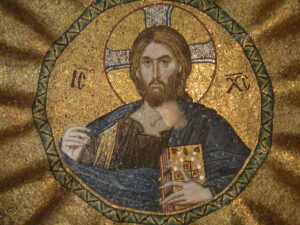
Surely it would make more sense for us to learn from all the great teachers and philosophers and religions in the world. From Jesus, of course, but also from Muhammed and the Buddha and Confucius, from Hinduism and Taoism and from African and Native American and other indigenous religions, and also from Plato and Socrates and Kant and even Marx and Nietzsche and Emerson and many more – and then from choose from all of them what is good and true. And certainly there is some truth and goodness to be found in all of them, for God’s Holy Spirit blows throughout the world – never forgetting that there are also other spirits.
But no. We Christians believe this One Man alone is key to it all: to life and death, to how we should live now, and how we can finally gain eternity. All things must be judged in light of Him who said “I am the way and the truth and the life.” On Him our Faith is built: the Old Testament, the Gospels, the Epistles, the Fathers, and every true Christian theologian and artist and musician and teacher and preacher for the past 2000 years.
Even more seemingly absurd, we put all our faith in this Man who was born not to honor in a royal household, but rather conceived by an unmarried teen-ager, and who grew up in humble surroundings, in an out of the way village in an obscure province, this Man who had no formal education, led no army, ruled no kingdom, who held no office, left no writings, whose public life lasted only three years, who died at the young age of 33, executed as a criminal. Why in the world would we put all our trust in somebody like Him?
It gets even stranger: We Christians believe that Jesus was the prophesied Jewish Messiah – despite the protestations of the Jews who say He definitely was not! And then we go even farther: We believe He is Savior and Judge of the the whole world – of everybody, whether everybody likes it or not.
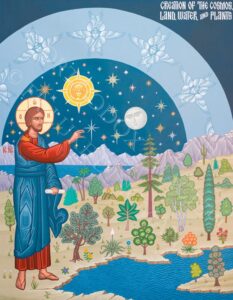 Finally, and most bizarre of all, we put Jesus of Nazareth, this human being, on the same “level” as God the Creator of all things. We Christians worship Him, pray to Him. No other religion in the world treats it founder like that. Muhammed specifically forbade devotion to himself. Muslims put their trust in the Koran, the book which he said was revealed to him. Buddhists have statues of the Buddha, but they don’t worship him; they believe only in The Way which he taught. Hindus pray to many gods and goddesses, but to none of them exclusively.
Finally, and most bizarre of all, we put Jesus of Nazareth, this human being, on the same “level” as God the Creator of all things. We Christians worship Him, pray to Him. No other religion in the world treats it founder like that. Muhammed specifically forbade devotion to himself. Muslims put their trust in the Koran, the book which he said was revealed to him. Buddhists have statues of the Buddha, but they don’t worship him; they believe only in The Way which he taught. Hindus pray to many gods and goddesses, but to none of them exclusively.
But we proclaim at every Divine Liturgy that Jesus of Nazareth is “true God of true God”. Don’t let these words just roll past you, brothers and sisters, without paying attention. And likewise when we hear in the Dismissal: “May Christ our true God…” and when we pray “To You, O Christ our God.”
To non-Christians, this seems outrageous, preposterous, illogical, irrational, implausible, nonsensical, shocking, ridiculous, foolish, crazy, absurd, arrogant, objectionable, and (to many) blasphemous.
“Oh, sure!” should definitely not be our reaction here.
How did we come to believe Jesus is God?
Let’s take the given evidence from His life. We must be careful here of “proof-texting”, that is, picking out a verse or two from the Bible to prove a point. The Scriptures can be mis-used that way to prove almost anything.
We have more accounts of the life of Jesus than of any other ancient person, and all four books of the Gospels are filled with the affirmation that Jesus of Nazareth is God – sometimes presented subtly, sometimes very directly. Read the New Testament from this perspective, and the consistent evidence fairly jumps out at us.
From the beginning we hear it:
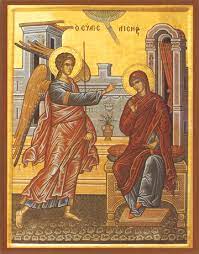 The angel announced to the Virgin Mary: “The Holy Spirit will come upon you, and the power of the Most High will overshadow you, therefore the child to be born will be called holy, the Son of God.” Luke 1:35
The angel announced to the Virgin Mary: “The Holy Spirit will come upon you, and the power of the Most High will overshadow you, therefore the child to be born will be called holy, the Son of God.” Luke 1:35
with permission of Saint Isaac’s Skete at skete.com
Don’t miss the meaning of that title “the Son of God”. In the Old Testament “son of God” is used rarely, and (I think) only applied to one individual: David as the progenitor of the Christ who was to come. But now the Christ, the Son of God comes. And just as a human son has the same human nature as his father. so “Son of God” means Jesus has the same divine nature as His Father.
John the Apostle introduces it directly: “In the beginning was the Word, and the Word was with God, and the Word was God… The Word became flesh and dwelt among us. We have seen His glory, the glory of the only Son of the Father, full of grace and truth.” John 1:1,14
How did the Apostles come to believe in the divinity of Jesus? This had seemed absolutely impossible to them. Jews were the first people on earth who believed that “I am the Lord your God. Beside Me there is no other.” Isaiah 45:5 God was spirit, not flesh and blood. And for these faithful Jews to believe that somehow this Man Jesus is God went against every fibre of their being.
Yet what were they to make of Him? He said and did things which no mere man had the right to do. He led them into it, step by step. Here is only a little of the evidence.
He healed a crippled man, saying, “Son, your sins are forgiven”. The Pharisees asked “Who can forgive sins but God alone?” Mark 2:7 Who indeed?
 Jesus commanded the storm “Hush. Be still” and it was. The disciples fearfully ask: “Who then is this, that even the wind and the sea obey him?” Mark 4:35 Who indeed?
Jesus commanded the storm “Hush. Be still” and it was. The disciples fearfully ask: “Who then is this, that even the wind and the sea obey him?” Mark 4:35 Who indeed?
courtesy of Pravmir
Part way through His ministry, Jesus thought it was time to ask the big question: “Who do you say that I am?” Peter confessed, “You are the Christ, the Son of the living God.” Jesus accepted the title. “Flesh and blood have not revealed this to you, but my Father in heaven.” Matthew 16:16-17
He called Himself Son of Man (a Messianic title – see Daniel 7), claiming “The Son of Man is Lord of the Sabbath” Matthew 12:8 But who gave the Sabbath Law?
“I and the Father are one.” John 10:30
“Whoever has seen me has seen the Father.” John 14:9
“Therefore I will send you prophets and wise men and scribes, some of whom you will kill and crucify.” Matthew 23:34 Only God send prophets, and note: This is something He says He will do after His death.
“Heaven and earth will pass away but my words will never pass away.” Matthew 24:35
 The Jews answered Him, “For a good work we do not stone You, but for blasphemy; and because You, being a man, make Yourself out to be God.” John 10:30-33
The Jews answered Him, “For a good work we do not stone You, but for blasphemy; and because You, being a man, make Yourself out to be God.” John 10:30-33
“Truly, truly, I say to you, before Abraham was born, I am.” John 8:58 When Moses asked God Who are You? God answered “I am who I am!”
Many people thought Jesus was crazy: “You’re demon-possessed”.
However the authorities knew what He was up to. They “tried all the harder to kill Him. Not only was He breaking the Sabbath, but He was even calling God His own Father, making Himself equal with God.” John 5:18
While He was in Jerusalem, fearing people would believe in Him they sent the temple guards out to haul Him in. They returned without Him. “Why didn’t you bring him in?” “No one ever spoke the way this Man does,” the guards replied. John 7:45-46
At His trial before the Sanhedrin, He was asked “Tell us under oath. Are you the Son of God?” He answered, “You have said so.” (This was an indirect way of saying “yes”.) That was why they cried “You have heard the blasphemy. What is your verdict?” “He deserves to die.” Matthew 26 And if He was not God, by Jewish Law He indeed deserved to die.
He was put to death because He claimed to be God. And then…
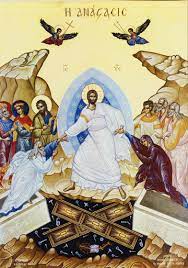
His rising from death had only one possible meaning.
The Apostle Thomas was first to declare the obvious: “My Lord and my God!” John 20:28
This has been the Church’s proclamation ever since:
“In Christ the fullness of deity resides in bodily form.” Colossians 2:9
“Christ Jesus, who, being in the form of God, did not consider it robbery to be equal with God….” Philippians 2:5-7
“You, Lord, in the beginning laid the foundation of the earth, And the heavens are the work of Your hands. They will perish, but You remain; And they will all grow old like a garment; Like a cloak You will fold them up, And they will be changed. But You are the same, and Your years will not fail.” Hebrews 1:10-12
“Jesus Christ is the same yesterday, today, and forever.” Hebrews 13:8
Finally in the book of Revelation, John’s vision of his best friend, of the Lord in glory is preceded by these words:
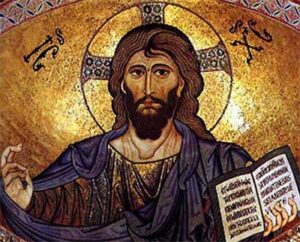 “I am the Alpha and the Omega, the Beginning and the End,” says the Lord, “who is and who was and who is to come, the Almighty.” Revelation 1:8
“I am the Alpha and the Omega, the Beginning and the End,” says the Lord, “who is and who was and who is to come, the Almighty.” Revelation 1:8
That is some of the written evidence for the divinity of the Man Jesus of Nazareth.
Try to imagine any of the words above being written about any human being who has ever walked this earth – and then taken seriously by millions, now billions of people generation after generation after generation.
And if this is true, then all things in this world and the next indeed hang on this One Man, our Lord and God and Savior Jesus Christ.
“But if God was on earth, Who was running the universe?” It took several centuries for the Church Fathers to begin to imagine how this could be possible. We’ll try to deal another time with the mysterious doctrine of the Holy Trinity.
But there’s more to it
The above evidence alone does not completely explain why we believe in Jesus Christ. This is harder to describe.
From the time of the Apostles till today, there has been something utterly compelling about the Man. What was it about Him personally that caused Peter, Andrew, James and John and the rest to drop everything and follow Him? Jesus was popular for a while, drawing great crowds, but towards the end most people turned away. Jesus asked His disciples, who knew Him well, “Will you also go away?” Simon Peter answered Him, “Lord, to whom shall we go? You have the words of eternal life. And we have come to believe and know that You are the Christ, the Son of the living God.” John 6:67–69
And that is how it has been for millions, billions of His faithful followers. How else are we to explain the martyrs without number who went to their deaths, rather than turn away from Him? and faithful people, both ordinary and famous, known to the world and unknown, who have followed him all the days of their lives? It’s because they just cannot turn away from Jesus and still live – be alive physically, yes, but in their hearts and souls and minds to live without Him would not be Life.
There have been others in history (I’m sure you can think of some) who have had a compulsive, hypnotic effect on people, holding onto them by fear and manipulation, then drawing them into evil and chaos.
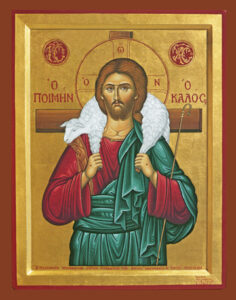 But Our Lord God and Savior Jesus Christ is our Good Shepherd. Gently He draws us to Himself by His love and His truth and His goodness, and then He leads us on. Yes, we could leave Him. But “Lord, to whom shall we go? You have the words of eternal life. And we have come to believe and know that You are the Christ, the Son of the living God.”
But Our Lord God and Savior Jesus Christ is our Good Shepherd. Gently He draws us to Himself by His love and His truth and His goodness, and then He leads us on. Yes, we could leave Him. But “Lord, to whom shall we go? You have the words of eternal life. And we have come to believe and know that You are the Christ, the Son of the living God.”
Conclusion
When we come to the part in the Creed where we say this Man Jesus of Nazareth is “begotten of the Father before all ages; Light of Light, true God of true God, begotten, not created, of one essence with the Father, through Whom all things were made”, our proper reaction should be to have our eyes get big and our mouths fall open in wonder. Alright, so it would be hard to say the Creed that way, but you get the point.
At least, if anyone should ask you if you believe Jesus Christ is your Lord and God and Savior, please do not say, “Oh, sure!”
Next Week: We prepare to prepare to prepare to prepare for Pascha with the story of Zacchaeus.
Week after Next: We continue with the story of The Canaanite Woman.